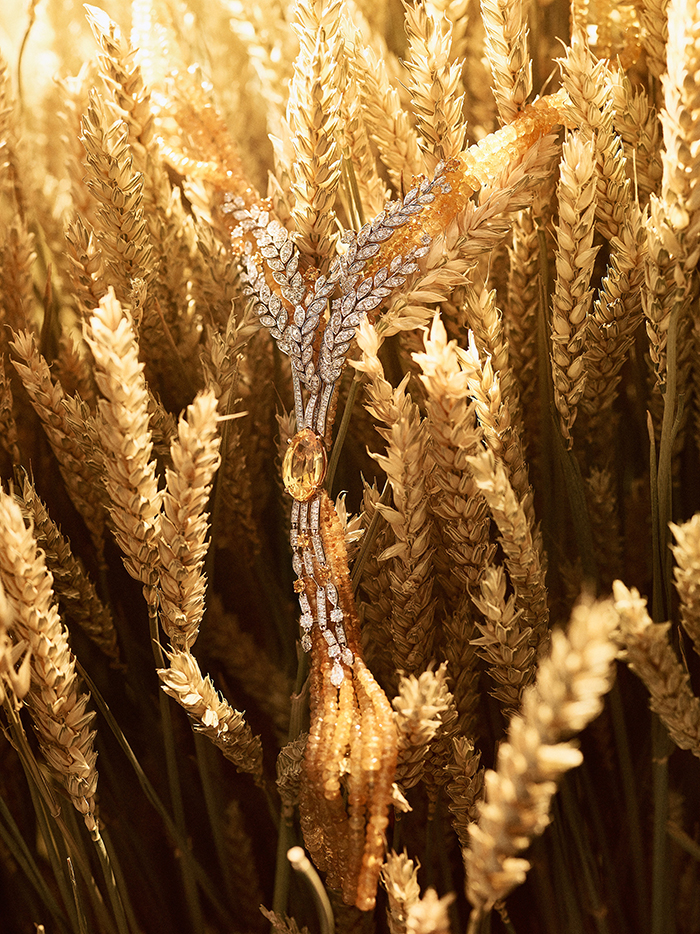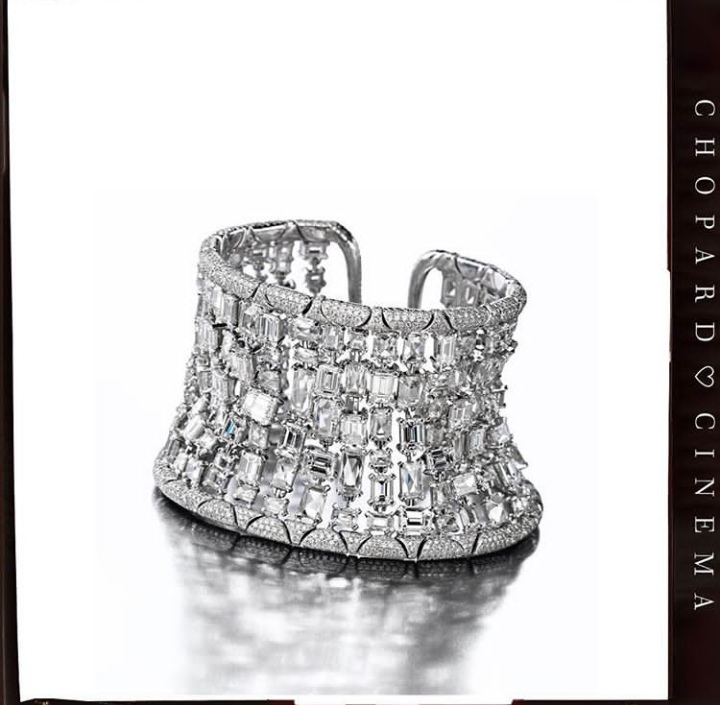
ساعة (L.U.C XP Urushi Year of the Rabbit)
إصدار محدود من شوبارد chopard يضم 88 قطعة مصنوعة من الذهب الأخلاقي الوردي عيار 18 قيراط
يصوّر فن “الأوروشي” التقليدي أرنبين يقفزان تحت ضوء القمر المشع بالأمل
في تقويم السنة الصينية الجديدة
باعتبارها عمل فني بديع مصنوع من الذهب والورنيش ويجمع بين الميكانيكا الدقيقة والحرفيّة الرفيعة،
احتفاء سنوي
تحتفي ساعة (L.U.C XP Urushi Year of the Rabbit) بحلول عام الأرنب المائي
من خلال إصدار محدود يضم 88 ساعة مبتكرة مستوحاة من تقويم الأبراج الصينية.
L.U.C XP Urushi Year of the Rabbit من شوبارد chopard صنعت علبة الساعة من الذهب الأخلاقي الوردي
عيار 18 قيراط بقياس قطر الساعة 39,5 ملم، وتحتضن مينا مزين بلوحة عن الأرنب –
الذي يعتبر حيواناً حذراً ومتيقظاً- والعلاقة التي تربطه مع القمر. طلي المينا بورنيش “الأوروشي” مع تطعيمات
من مسحوق الذهب وعرق اللؤلؤ بيد فنان ياباني يستمد حرفيته الرفيعة من خبرة تمتد لقرون طويلة،
لتضفي هذه التقنية الفنية حساً مفعماً بالرمزية والازدهار على هذا الإصدار المرغوب.
وتتميز الساعة بعلبة فائقة النحافة وتعمل بحركة (L.U.C 96.17-L) المزودة باحتياطي طاقة لمدة 65 ساعة لتشهد على الخبرة العريقة في صناعة الساعات التي يتميز بها
الحرفيون المهرة في ورشات معمل شوبارد.
سيبدأ “عام الأرنب المائي” وفق التقويم الصيني يوم 21 يناير 2023. وتماشياً مع تقليد تتبعه شوبارد chopard
منذ أمد بعيد، تنتج الدار سنوياً سلسلة من الساعات تمثل علامة البرج الصيني في عامها.
حيث يتنظر هواة اقتناء الساعات إصدار هذا الإبداع المميز بفارغ الصبر، لاسيما أن الإصدار المحدود يقتصر على 88 ساعة فقط. صنعت علبة الساعة فائقة النحافة من الذهب الأخلاقي الوردي
عيار 18 قيراط، وتنبض على إيقاع حركة فائقة النحافة من عيار (L.U.C 96.17-L) الذي يتم تعبئته ذاتياً بالطاقة
بواسطة دولاب تعبئة متناهي الصغر. وفي كل عام، يصنع مينا إصدار الساعة الجديد
في اليابان على يد حرفي ياباني ذو شهرة عالمية متخصص في تقنية (Maki-e).
ويختلف الإصدار في كل عام من حيث صورة المشهد المتعلق بعلامة البرج ورمزيته التي تجسدها شوبارد على مينا الساعة.

تصوير رمزي وفني
مع اقتراب حلول العام الصيني الجديد، تقدم شوبارد موضوعاً يتناول ببراعة رمز الأرنب في الأبراج الصينية.
ففي الأساطير القديمة المتعلقة بنظام الأبراج الصينية (zhānxīngshù)، يقيم الأرنب على القمر برفقة سيدة القمر
الجميلة “شانغي”. ويمثل عنصر “الماء” كما يرمز للحكمة ورشاقة الحركة،
ليبشر بذلك بطول العمر والسلام والازدهار.
وعلى هذا الأساس، أبدع حرفيو الورنيش اليابانيين الذين تتعاون معهم دار شوبارد مينا يصور أرنبين
أحدهما أحمر والآخر رمادي يمرحان معاً تحت ضوء البدر في مشهد تتخلله أشجار الزيتون الصينية،
باعتبارها شجيرة آسيوية عطرة ترمز للنجاح والإنجاز؛ وهي قيم ترتبط في أغلب الأحيان بالأرنب.
وبذلك يجمع المشهد بين كافة العناصر الرمزية الأساسية للأرنب المتقد بالطاقة واليقظة والذكاء
، حيث تشير النظرة الحادة في عيون الأرنبين وآذانهما المنتصبة إلى حالة التأهب الدائمة للأرنب.
نهج يعتمد أرفع درجات البراعة الحرفية
التزاماً منها بالتقاليد العريقة وإحيائها والحفاظ عليها، تعمل شوبارد مع نخبة من حرفيي الورنيش اليابانيين
الذين يصنعون مينا ساعات (L.U.C XP Urushi) باستخدام تقنية طلاء ورنيش “أوروشي” التقليدية.
تم إنتاج 88 مينا لإصدار ساعة (L.U.C XP Urushi Year of the Rabbit) في ورشات العمل التابعة
لشركة “يامادا هياندو” التي تأسست قبل قرن مضى، حيث صنعت هذه الموانئ على يد كبير حرفيي الطلاء بالورنيش
“مينوري كويزومي” التي تستغرق ما لا يقل عن 160 ساعة من وقته لإنجاز هذه المهمة الدقيقة.
تقنية جديدة
وتعتمد تقنية (Maki-e) المميزة على وضع طبقات من الورنيش المستخرج
من نسغ شجرة “السماق السام الورنيشي السيّال” (Toxicodendron vernicifluum)، وبين هذه الطبقات
تنتشر نثرات مسحوق الذهب لتنير خلفية المشهد.
وقد وجه المصمم تركيزه على إتقان جميع التفاصيل الدقيقة لهذا المشهد
ليكشف بذلك عن مزيج من الواقعية الصارخة والجمال الرومنسي.
ساعة ذات دقة فنية رفيعة
صنعت علبة ساعة (L.U.C XP Urushi Year of the Rabbit) بالكامل
من الذهب الأخلاقي الوردي عيار 18 قيراط والمستورد عبر سلسلة توريد أخلاقية
ساهمت دار شوبارد في تأسيسها. ويبلغ قطر
العلبة 39,5 ملم ويضمن إطارها النحيف فتحة واسعة للميناء.
وبالإضافة إلى
كونها ساعة مميزة ذات تصميم أنيق وزخرفة راقية، تتسم هذه الساعة بكونها فائقة النحافة حيث لا تتجاوز سماكتها حدود6,80 ملم.

أداء ميكانيكي فائق
تكتسب ساعة (L.U.C XP Urushi Year of the Rabbit) نحافتها الفائقة بفضل تزويدها بعيار (L.U.C 96.17-L)
المصنوع ضمن ورشات معمل شوبارد. ولا تتخطى سماكة هذه الحركة الميكانيكية ذاتية التعبئة 3,30 ملم،
وذلك بفضل دولاب تعبئة لا مركزي متناهي الصغر مصنوع من الذهب الأخلاقي عيار 22 قيراط.
يتكون هذا الدولاب من ثقل متذبذب صغير مدمج ضمن هيكل العيار، ويتسم بعطالة مرتفعة
مما يتيح له بكفاءة تامة تعبئة خزانيّ الطاقة المتراصّين وفق تقنية (Chopard Twin) بحيث يمكنهما
تخزين الطاقة اللازمة لتشغيل ساعة (L.U.C XP Urushi Year of the Rabbit) من خلال توفير احتياطي
طاقة لمدة 65 ساعة. وبالتالي ستستمر الساعة في العمل بدقة متناهية بعد خلعها عن المعصم لمدة تزيد عن يومين ونصف التي تعادل مدة عطلة طويلة في نهاية أسبوع.
قصة ربع قرن من البراعة الحرفية
تشكل ساعة (L.U.C YP Urushi Year of the Rabbit) جزءاً من قصة بدأت فصولها عندما أطلقت
دار شوبارد بإدارة كارل-فريدريك شوفوليه مجموعة ساعات (L.U.C) وكرستها للاحتفاء
بفن وتقاليد صناعة الساعات الفاخرة.
حملت أول ساعة ضمن هذه المجموعة اسم (L.U.C 1860) وأصدرت في عام 1997.
وتوسعت هذه المجموعة على مر السنين لتقدم باستمرار تقنيات معقدة ومبتكرة في ساعات رائعة تم ابتكارها وتطويرها وإنتاجها وتركيبها وتزيينها والمصادقة عليها وفقاً لأرفع تقاليد صناعة الساعات السويسرية
في ورشات تصنيع الساعات الخاصة بدار شوبارد المتواجدة في فلورييه وجنيف.
وتمثل ساعة (L.U.C YP Urushi Year of the Rabbit) فصلاً جديداً في هذه الحكاية الشيّقة،
وتستعرض في الوقت ذاته قدرات شوبارد الفذة في التجديد والإبهار.
وبإصدارها المحدود الذي يقتصر على 88 ساعة فقط، تجسد هذه الساعة النادرة والمرحة رموز التصميم
وصناعة الساعات في شوبارد ببراعة تستحق سعي عشاق اقتناء الساعات للحصول عليها.
.






